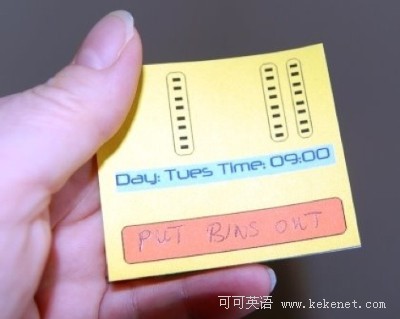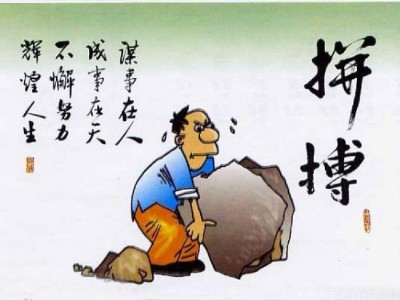(单词翻译:单击)

Writers 作家们
1. Addicted to Notecards: Vladimir Nabokov used 5- by 8-inch index cards to compose and order the scenes in his novels. This allowed him to experiment with the order of the chapters before transcribing the final manuscript.
1、爱好便笺。弗拉基米尔纳博科夫经常用5-8英寸的索引卡去撰写和排序小说的场景。这使得他能够在写最后的手稿前理清每章节的顺序。
2. Slow and Steady: Stephen King has explained that he always writes 10 pages a day, every day of the year (even holidays). His slow and steady approach to project management has ensured that he has a steady stream of new works entering the marketplace, and he is one of the most prolific modern authors working in America today.
2、慢条斯理,稳扎稳打。史蒂芬金说他保持每天写10页的速度,即使是在节假日也是如此。他的稳定的创作速度保证了他的新作品源源不断地进入市场,他是现在美国唯一一个多产的作家。
3. Get Up Early: Writers like Mary Higgins Clark and Sylvia Plath started writing at 5 am and 4 am each day, respectively. Both women had small children, and those early moments in the day were the only time they had to pursue their writing careers. Writer Denison Hatch forced himself to write just 500 words per day before starting his day job, and ultimately sold three novels.
3、早起。像玛丽克拉克和希金斯普拉斯这样的作家分别在每天清晨4点和5点开始写作。因为有小孩要照料,女作家们只能在每天的早些时候开始写作。像作家丹尼森哈奇每天规定自己在日常工作之前写500字,正是这个速度也使得他出版了三本小说。
4. Get Centered With a Favorite Book Passage: Some writers need to go through the ritual of touching base with a favorite literary totem. For example, Somerset Maugham would read Voltaire’s “Candide” before starting work, while Willa Cather read the Bible.
4、集中注意力阅读最爱的文章或段落。一些作家总会例行阅读一些自己最喜欢的文学读物来为写作奠定情感基调。例如,毛姆会在工作前阅读伏尔泰的《老实人》,而凯瑟则会读圣经。
Businessmen and Entrepreneurs 商人和企业家门
5. Be Impulsive: In business, if you have a good idea, you need to move quickly to keep ahead of your competition. In the words of Bill Gates, “When you find a good idea act on it right away.”
5、保持进取。在商界,如果你有好的想法,那么你需要加快行动赶在对手前面。比尔盖茨说过,“如果你有想法就立刻去行动”。
6. Get Ahead By Making It Personal: “Big businesses will always try to crush small upstarts. To beat big businesses, use the strengths of being small. Big corporations are impersonal; staff are often not treated well. At a small company, you can make sure your staff are proud of working for you and then they’ll work hard to be successful. And small companies are more nimble.” – Sir Richard Branson
6、通过人性化的管理走在前面。“大企业总试图消灭小公司,想要打败大企业,应该使用小公司的优势。大企业通常不是个人的,员工们得到的照顾很少,而在小企业中,你可以通过人性化的管理使得他们以为你工作而骄傲,同时不断地取得工作上的业绩。同时小企业也更加灵活自如。”——理查德布兰森爵士
7. Work Long Hours Now, Reap the Benefits Later: Ben Franklin knew the benefits of working long hours, as well as being known among his peers as being a person who worked long hours. This work ethic was essential for growing his printing business. He also had a routine of asking himself questions during the day. Ben Franklin asked himself each morning (at 5 am), “What good shall I do today?”; every night before bed (around 10 pm), “What good have I done to-day?”
7、先苦后甜。本富兰克林知道长时间工作的益处,也成为了同辈中长时间工作的人。这个工作法则使得他的印刷事业蒸蒸日上,他经常在白天对自己提出一些问题,每天清晨5点,本富兰克林都会问自己,“我今天最好要做什么?”,每天晚上睡觉前,大约10点,他又会问自己“我今天做了什么?”

Thinkers and Artists 思想家和艺术家
8. Get Extreme: Architect Bernard Tschumi avoids procrastination by working at one of two extremes. “I work best either under pressure or by emptying my brain over the weekend,” he explains. “That blank state is helpful. It is like an athlete before a competition.”
8、走另类路线:建筑师 伯纳德屈米通过两种较为边缘的方式避免拖延。“在高压和头脑空白的周末我的工作效率最高”他解释说,“就像一个即将参加比赛的选手,大脑空白状态对于他来说很好”
9. Force Yourself to Stay Focused: Greek orator Demosthenes would force himself to stay focused on composing his orations by shaving off half of his hair, making him look so ridiculous that he wouldn’t be tempted to procrastinate by leaving his home. Victor Hugo would do something similar, forcing himself to meet his daily writing goals by having his valet hide his clothes. Yup, the guy who wrote “Les Miserables” liked to work in the nude.
9、迫使你自己全神贯注。希腊演说家 狄摩西尼会通过剔去自己一半的头发来强迫他自己全神贯注于他的演讲创作,因为这样的做法,使得他看起来就会很怪异,因此这样无法出门,自然增加了他在家的时间。 会做一些同样的事情,迫使自己完成每天的写作任务,他会让男仆藏好他的衣服。是的,就是这样,他接近于裸体地写出了《孤星泪》
10. Never Take Your Eyes Off Your Competition: Playwright Henrik Ibsen would work at a desk decorated with a portrait of arch-rival playwright August Strindberg. Try keeping a picture of your competitors face or company logo on your desk to spur you to new heights.
10、时刻不忘竞争:剧作家亨利克易仆生将桌子装饰成劲敌剧作家斯特林保的画像。尝试着将竞争者的画像或者竞争公司的标志放置在桌子上,将会成为动力,激发你达到一个新高度。
11. Use Caffeine (But Don’t Abuse It): Mathematician Paul Erdös used the last 25 years of his life to devote 19 hour days to the pursuit of higher math. To stay alert, he amped himself up with 10 to 20 milligrams of Benzedrine or Ritalin (along with strong espresso and caffeine tablets.) “A mathematician,” he said, “is a machine for turning coffee into theorems.”
11、喝咖啡(但不要喝得太多):数学家保罗实德在过去的25年里,每天投入19个小时研究高等数学。为了保持清醒,他服用10—20毫克的苯丙胺或利他林(同时食用含有强力作用的咖啡喝咖啡因药片)。“数学家,”他说,“就是一个将咖啡变成数学定理的机器。”
12. Blow Off Some Steam: King Otto, ruler of Bavaria from 1886 to 1913, shot a peasant every morning to start his day. Thankfully, his two advisors were kind-hearted: one gave the king a rifle filled with blanks, and the other dressed as a “peasant”, acting out death throes when he was “shot”. While shooting people is absolutely NOT okay, never underestimate the stress relief you can get from a few rounds of Call of Duty.
12、发泄抑制的情感:国王奥托,1886—1913年巴伐利亚的统治者,以射杀一名农仆来开始他的一天。幸好,他的两个善良的顾问,一个给国王枪支,另一个扮作农仆假装被国王射杀而死。尽管强杀人是绝对不可行的,但你永远无法估量这带给你带来的压力顿减的感受。
Conclusion 总结
These examples of the daily routines and productivity tricks of famous people may not be ideally suited for your busy lifestyle, but they are certainly worth keeping in mind the next time you are stuck on a project and need help powering through. And seriously, don’t pull a “King Otto”. That would not be cool.
名人的这些每日例行和增加工作效率的招数可能并不适合你忙碌的生活方式,但是你可以把这些记在心里,下次当你陷入工作项目的困境而需要力量使你度过难关时,这些都很有用。同时真诚希望你不要成为国王奥托,这并不很酷。


